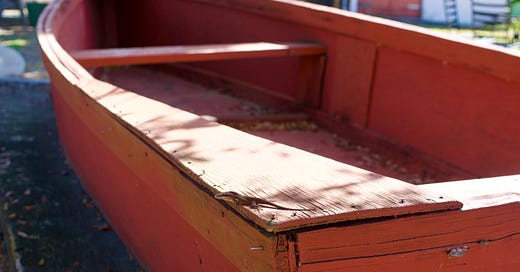At eight years old I couldn't imagine what would become of me. I had watched my dad walk through a window, attempting to reach a blinding light he believed was God. I had seen sheriff’s deputies hie him away in a patrol car, had seen my mother weeping, had wandered through our four-room house wide-eyed and mute until I, book in hand, squeezed myself behind the bed I shared with my sister.
The story was the life of George Washington Carver, who was like me a person to whom things had happened but whom had survived, poor Carver without either parent and without agency.
I did not know when my father would return, if ever, and I tried to overlook the worry in my mother's eyes and not ask her questions that made her scared. I thought about The Boxcar Children, a book my teacher was reading aloud to my class at school, about four children who lost both parents and lived alone in an abandoned boxcar in the woods. I knew things had ended well for those kids.
Somewhere in the grim months of my father’s first nervous breakdown—which became a black hole in my memory, a void of bleak uncertainty and maybe even despair—I learned what could save me and, by extension, save all of us.
I know nothing more powerful than the power of stories. I say this again: They saved my life.
Immersion in story when I was most impressionable drove home what my father already demanded of his children before a supernova sucked him away, that we understand the art of empathy. Stories of the "other" are the scaffolding of empathy, and in my father's paradigm, empathy required action. For example, a heron struck on the highway required that my father splint its broken wing. An elderly man who appeared at my dad’s junkyard on Christmas Day hoping to pawn tools meant gathering up a box of food. A hitchhiker needed a ride.
Exactly what would become of me was set in motion during those early years on a junkyard in southern Georgia, with my father locked away in a crazyhouse in Milledgeville and orbiting a far and bewildering side of the universe, and my mother tight-lipped, doing what had to be done.
I would become a writer of stories with hidden agendas, essentially to make the world a more empathetic place.
If the arc of time bends toward justice, stories are what push us along. I believe that the world needs stories. Human civilization depends on them. I believe that all stories matter. Your story matters. I long to know who you are, what you have seen, and what you know. Therefore, you matter. What happens to you matters.
Let’s Compare Our Lives
Today I was reading an article about Canadian publishing versus U.S. publishing, and it turns out that Canada heavily subsidizes its literary fiction with huge grants, mostly not available in the U.S. Then that writer recommended a Substack
and I had a minute, so I checked it out. There Biggs recommended a new documentary about Jason Isbell. In it, apparently, Jason says that writing is like us saying, “Will you listen to what my life is like? And let's compare.”Will you listen to what my life is like? And let’s compare.
I like that. I don’t think it gets to the massive power of stories, but it’s a start.
If you’re struggling with why people would want to read you as a writer, then think about what I just said to you—stories help us empathize, stories change the world, stories matter. And also ponder Jason’s words—stories let us know what your life is like, so we can compare ours to it. You can teach us what you know that we haven’t realized yet.
We don’t have time for self-doubt. Just get the first word down.
CNF Course Starts June 5
My 6-week course Magical Craft of Creative Nonfiction 1.0 is open for registration. Sessions are MONDAYS 7-9 pm starting June 5. I open the Zoom room at 6 pm for socializing, introducing ourselves, sharing resources, and asking questions. In this course we write micro-memoirs, flash essays, prose poems, essays, and other forms of creative nonfiction. It’s a beginning course, although it will challenge even folks who have been writing awhile, I promise. I highly recommend it, as do many of the people who have taken it. If you are interested but not sure if my teaching style fits with your learning style, then be in touch so I can answer your questions.
If you’re struggling with self-doubt about your writing, then you need me, because I give zero attention to inner glass ceilings. Break through the thoughts that keep you from doing the work. And the best way is to show up.
It’s easy. Just show up.
The place to register is here. Or you’re welcome to pay by check. We can easily make those arrangements.




